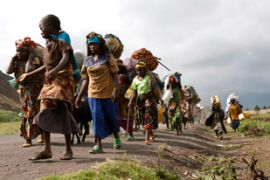Civilians flee DR Congo flashpoints
Thousands head towards refugee camps amid lull in fighting between government forces and rebels.

However, thousands of civilians continued to flee to UN refugee camps in Goma to escape the conflict, and facilities are struggling to cope.
“There is little available to take care of [people displaced by the fighting],” Adow said. “They are going to camps that are already overcrowded, and as the fighting nears the camps they are displaced once again.
| Video | ||||||
|
“Some people are sleeping on the side of the road; there is little aid getting to them.”
The UN estimates that about 253,000 people have been displaced since September.
Staff from the UN mission in DR Congo (Monuc) have had little impact in curbing the fighting, Adow said.
“The UN is there and has been sending teams to the battle scenes. But they can only stand around and watch as the fighting continues.
“In Goma, the UN has only 850 personnel … They are outnumbered – there are thousands of rebels and thousands of government forces.”
On Friday, African leaders gathered in the Kenyan capital, Naiorbi, called for an immediate ceasefire in eastern DR Congo.
The appeal came as the UN accused Nkunda’s National Congress for the Defence of the People (NCDP) of deliberately killing civilians in North Kivu.
Monuc said that one of its inspection teams had reported “serious violations of human rights” in Kiwanja, 80km north of Goma.
“Witnesses have described incidents during which civilians lost their lives” as Mai-Mai militia fighters attempted to seize the town from NCDP forces, which Nkunda says he has mobilised to protect ethnic Tutsis.
The UN statement said investigators “visited 11 communal grave sites, containing at least 26 bodies, fighters and civilians”.
Nkunda, who was not invited to the talks in the Kenyan capital, has issued a “categorical denial” that his fighters were behind any civilian deaths in Kiwanja.
Human Rights Watch says at least 100 civilians have been killed and more than 200 others wounded since the fighting resumed in late August.
Regional peacekeepers
Moses Wetangula, Kenya’s foreign minister, reading a communique agreed by seven African leaders on Friday, said: “There should be an immediate ceasefire by all the armed men and militia in North Kivu.”
He said that regional peacekeepers could be sent to North Kivu if required.
 |
The meeting also called for the formation of a “humanitarian corridor” to aid the refugees.
Babou Amane, deputy spokesman for Nkunda’s forces, told Al Jazeera on Friday: “The African summit is following us in our decision to have a unilateral ceasefire … we would like the summit to force the [Congolese] government to follow up the ceasefire.
“We have asked the government to sit round the table so we can discuss our issues … [but] if the government engages us, we will respond,” he said.
There are fears that regional forces could be drawn into the conflict and Ban Ki-moon, the UN secretary-general, had told delegates that the conflict could engulf the region.
“It is only at the political level, here in your region, that lasting solutions can be found. There can be no military solution to this crisis,” he said.
Ban denied an earlier UN report saying that Angolan troops had joined Congolese soldiers.
On Friday, a UN official and a Uruguayan peacekeeping officer said that an unspecified number of Angolan troops had arrived four days ago. The two officials spoke on condition of anonymity.
Mistaken identity
In New York, Edmond Mulet, the UN assistant secretary-general for peacekeeping, suggested some people may have mistaken Congolese government troops who had trained in Angola, and therefore spoke Portuguese, for Angolan troops.
There is widespread concern that the involvement of Angolans could spread the conflict beyond Congo’s borders. The war in Congo from 1998 to 2002 drew in more than half a dozen African nations.
The DR Congo government has repeatedly said that Nkunda’s forces are backed by Rwanda’s Tutsi administration.
Rwanda’s information minister denied that Kigali has had any role in supporting Nkunda.
“Those who claim that Rwanda is directly involved and that Rwanda is supporting Laurent Nkunda and the CNDP are totally wrong,” Louise Mushikiwabo told Al Jazeera.
“This is one of the reasons why this conflict has not been stopped. Nkunda is Congolese, he has claimed that the government of DR Congo [must] address. The root problem of this instability is … the Hutu death squads that are based in eastern DR Congo.
“There is no support from Rwanda going to Laurent Nkunda. The sooner that the Congolese government and the international government address this issue, the sooner this conflict will end.”


